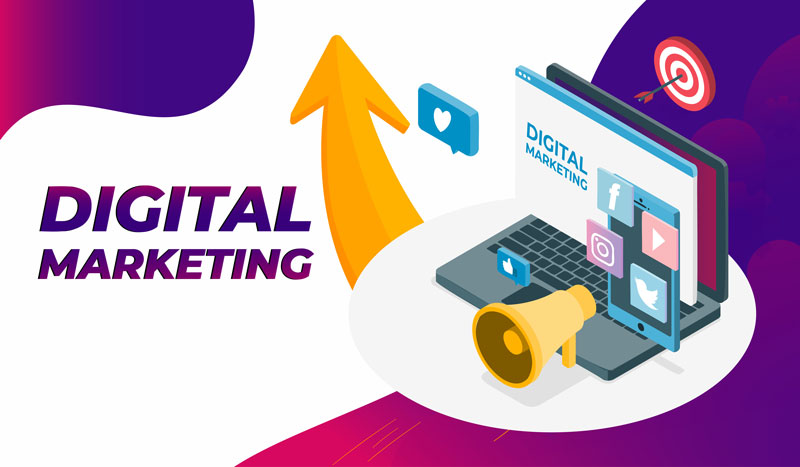In the modern digital age, businesses must leverage the power of the internet to reach their target audience effectively. Digital marketing services encompass a broad spectrum of online marketing strategies designed to enhance brand visibility, drive traffic, and increase sales. This article explores various digital marketing services, their benefits, and how businesses can utilize them to stay competitive.

What is Digital Marketing?
Digital marketing refers to the use of digital channels, such as search engines, social media, email, and websites, to promote products or services. Unlike traditional marketing methods, digital marketing offers measurable results, allowing businesses to optimize their strategies effectively.
The Importance of Digital Marketing
Digital marketing is crucial for businesses of all sizes. Some key benefits include:
-
Global Reach: Businesses can connect with audiences worldwide.
-
Cost-Effectiveness: Digital marketing is more affordable than traditional advertising.
-
Targeted Marketing: Businesses can reach specific demographics with personalized campaigns.
-
Measurable Results: Analytics tools help track campaign performance in real-time.
Types of Digital Marketing Services
1. Search Engine Optimization (SEO)
SEO is the process of optimizing a website to rank higher on search engines like Google. It involves:
-
On-Page SEO: Optimizing website content, meta descriptions, and images.
-
Off-Page SEO: Building backlinks and enhancing domain authority.
-
Technical SEO: Improving site speed, mobile-friendliness, and security.
2. Pay-Per-Click (PPC) Advertising
PPC advertising allows businesses to place ads on search engines and other platforms, paying only when users click on the ads. Popular PPC platforms include Google Ads and Bing Ads. Key benefits include:
-
Instant Visibility: Ads appear at the top of search results.
-
Budget Control: Advertisers can set daily spending limits.
-
Precise Targeting: Ads can be customized based on demographics, location, and search intent.
3. Social Media Marketing
Social media marketing involves using platforms like Facebook, Instagram, LinkedIn, and Twitter to engage with audiences. Strategies include:
-
Content Creation: Sharing informative and engaging posts.
-
Paid Ads: Running targeted ad campaigns.
-
Community Engagement: Interacting with followers through comments and messages.
4. Content Marketing
Content marketing focuses on creating valuable content to attract and retain customers. Common content formats include:
-
Blog Posts: Informative articles that address customer pain points.
-
Videos: Engaging content for platforms like YouTube and TikTok.
-
Infographics: Visual representations of data and concepts.
5. Email Marketing
Email marketing remains one of the most effective digital marketing strategies. It involves:
-
Newsletters: Regular updates sent to subscribers.
-
Promotional Emails: Announcing discounts, offers, and new products.
-
Automated Emails: Drip campaigns that nurture leads.
6. Affiliate Marketing
Affiliate marketing allows businesses to partner with influencers or other websites to promote their products. Benefits include:
-
Performance-Based Payments: Businesses pay only for successful conversions.
-
Expanded Reach: Leveraging an affiliate's audience for greater visibility.
-
Cost-Effective: Low investment compared to other marketing strategies.
7. Influencer Marketing
Influencer marketing involves collaborating with individuals who have a strong following on social media. Key advantages include:
-
Authenticity: Influencers provide genuine recommendations.
-
Higher Engagement: Audiences trust influencer endorsements.
-
Diverse Platforms: Effective on Instagram, YouTube, and TikTok.
8. Conversion Rate Optimization (CRO)
CRO focuses on enhancing website elements to increase the percentage of visitors who take desired actions. Tactics include:
-
A/B Testing: Comparing different versions of web pages.
-
User Experience (UX) Improvements: Simplifying navigation and design.
-
Clear Call-to-Action (CTA): Encouraging visitors to make purchases or sign up.
Choosing the Right Digital Marketing Service
When selecting digital marketing services, businesses should consider:
-
Business Goals: Identifying objectives such as brand awareness, lead generation, or sales.
-
Target Audience: Understanding customer demographics and preferences.
-
Budget: Allocating funds strategically across different services.
-
Competitor Analysis: Studying competitors’ strategies for inspiration.

Comments on “Digital Marketing Services: A Comprehensive Guide”